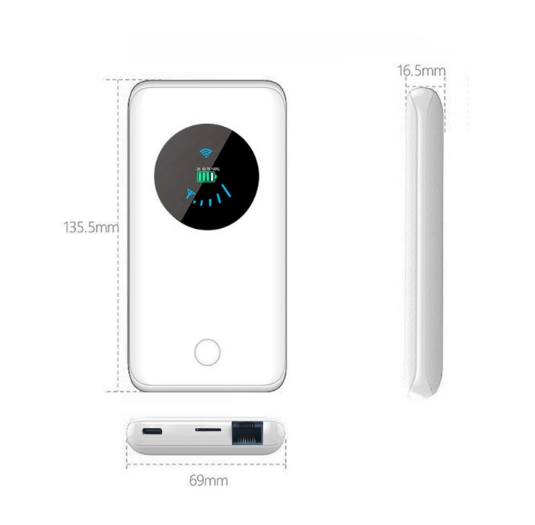MiFi vs WiFi - What's The Difference?
Do you ever find yourself mixing up WiFi and MiFi? You're not alone! Despite their similar-sounding names, WiFi and MiFi are distinct entities.
In this blog, we'll explore the definitions of WiFi and MiFi, as well as highlight their key disparities.
What is WiFi?
When you think of WiFi, you probably envision "wireless internet." However, WiFi itself isn't internet.
WiFi stands for wireless fidelity and is a wireless networking protocol based on IEEE 802.11 standards. It's the technology that enables smartphones, tablets, laptops, and other WiFi-enabled devices to connect to the internet without using cables.
In essence, WiFi-enabled devices connect wirelessly to a WiFi router or access point, which is then linked to an internet service provider. As long as you're within the coverage area of the router, you can stream and browse the internet from anywhere.
Without WiFi, internet access would still be possible, but only through ethernet cables.
WiFi is commonly found in homes, offices, cafes, airports, and various other public places.
What is MiFi?
MiFi is a compact, portable wireless router or hotspot device equipped with built-in WiFi technology. It utilizes your mobile carrier's LTE, 4G, or 5G network to establish an ad hoc WLAN (Wireless Local Area Network). This allows for internet connectivity on the go or in areas lacking traditional broadband infrastructure.
Unlike a traditional WiFi router, MiFi devices don't require a connection to an internet service provider. They only need cellular service. With a MiFi device, you can access the internet wherever there's a cellular signal available.
Without WiFi technology, mobile internet access wouldn't be feasible.
What's the Difference Between WiFi and MiFi?
WiFi serves as a technology enabling wireless internet connectivity. It's integrated into various devices, including traditional internet routers, cellular routers, mobile hotspots, MiFis, smartphones, tablets, and more. A WiFi network can be established via an internet service provider or cellular network, depending on your WiFi access point.
MiFi represents a specific type of WiFi access point. With a diverse array of MiFi models available, you can select one that suits your requirements. These devices connect WiFi-enabled devices to the internet using the cellular network. Portable and convenient, they ensure connectivity even when you're away from your home WiFi network.
A MiFi requires a cellular signal to function. Weak cell reception can affect data speeds for all connected devices.
You May Not Know About MiFi and WiFi
1) WiFi: Not an Acronym
Contrary to popular belief, WiFi is not an acronym. It does not stand for Wireless Fidelity, Wireless Fiber, or any other specific phrase.
Before settling on a name for the wireless networking standard, it needed to be easily remembered and understood. "IEEE 802.11" didn't quite fit the bill. The branding agency Interbrand suggested "WiFi" because its similarity to "HiFi" (High Fidelity) resonated with consumers and aided in comprehension.
In short, WiFi simply stands for WiFi.
2) MiFi: A Term for Portable Hotspot Devices
The term "MiFi" was coined by Novatel Wireless (now Inseego) in 2009 for their line of portable WiFi devices.
Today, "MiFi" is often used as a catch-all term for various portable hotspot devices, including cellular routers and mobile hotspots.
3) Traditional WiFi vs. MiFi Speeds
In comparison to traditional WiFi networks provided by an Internet Service Provider (ISP), MiFi devices, relying on cellular networks, may exhibit slower speeds. Factors such as terrain, distance to cell towers, network congestion, weather conditions, and building materials can impact the signal received by MiFi devices. Consequently, performance may vary as you change locations.
However, with the advent of 5G technology, MiFi speeds have the potential to match or even surpass those of traditional broadband internet. It's worth noting, though, that ultra-fast 5G coverage is not yet ubiquitous.
4) Security: Public WiFi vs. MiFi
Public WiFi hotspots, while convenient, pose security risks as they can be easily accessed by hackers. Since data is typically transmitted without encryption on public networks, hackers can intercept and obtain personal information.
In contrast, MiFi creates a personal WiFi network, restricting access and transmitting encrypted data, thus enhancing security.
5) MiFi as a Home Internet Solution
While wireless broadband internet remains the norm for homes and businesses, not everyone has access to it. In some regions, broadband internet prices may be prohibitively high.
MiFi serves as a viable alternative for home internet. It offers affordability and operates wherever there is cellular signal. However, it may not be suitable for every household due to limitations on data, speed, and bandwidth.
6) Enhancing MiFi Performance with a Cell Phone Booster or Upgraded Antenna
The performance of MiFi devices hinges on the strength of your cellular signal. In areas with robust signal coverage, connected devices will enjoy superior and faster connections. Conversely, weak signal areas yield poorer performance.
Whether weak signal results from distant cell towers or building materials obstructing signal transmission, a cell phone booster can enhance MiFi performance. These devices amplify the outside cell signal, improving reception and transmission inside your home, office, or vehicle.




